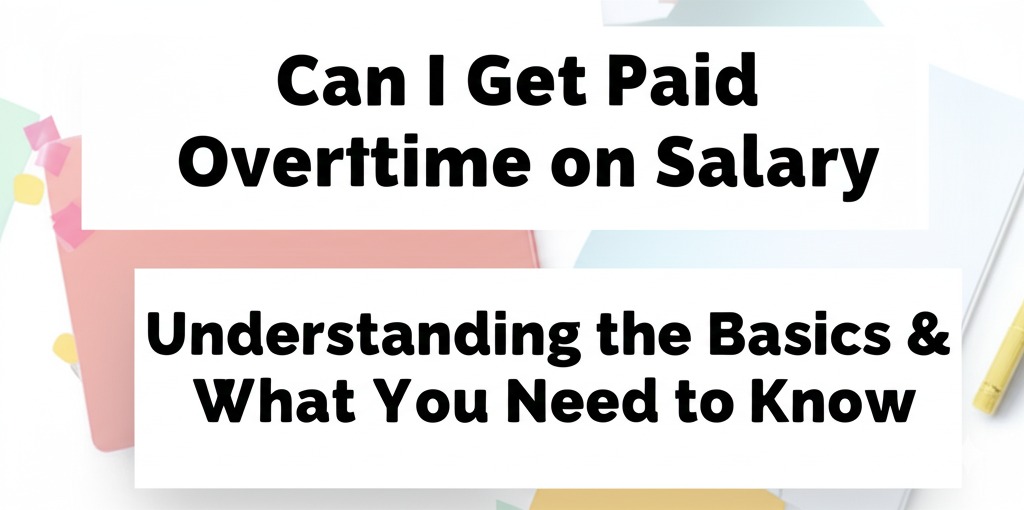
Overtime pay is a topic that often causes confusion among both employees and employers. If you’re a salaried employee, you may be wondering: Can I get paid overtime on salary? The simple answer is, it depends on a variety of factors such as your job duties, your salary level, and the regulations in your country or state. In this article, we’ll explore whether salaried employees are entitled to overtime pay, when overtime applies, and the critical distinctions between salaried and hourly positions.
Understanding Overtime Pay
Before we dive into whether salaried employees can receive overtime pay, let’s quickly recap what overtime pay is and how it generally works.
What Is Overtime Pay?
Overtime pay refers to additional compensation for hours worked beyond the standard 40-hour workweek. In most cases, this extra pay is calculated at a rate of one and a half times (1.5x) your regular hourly wage. However, overtime laws and eligibility can vary depending on factors like job classification and geographical location.
The Fair Labor Standards Act (FLSA)
In the U.S., the Fair Labor Standards Act (FLSA) is the primary law governing overtime pay. It sets the criteria for when an employee must be paid overtime and which employees are exempt from this requirement. Understanding whether your position is exempt or non-exempt will help you determine if you’re eligible for overtime.
Exempt vs. Non-Exempt Employees: Key Differences
The classification of employees as either exempt or non-exempt is a major factor in determining whether you can receive overtime on a salary. Let’s break down the differences:
Exempt Employees
Exempt employees are not entitled to overtime pay, regardless of how many hours they work. These employees are typically salaried and work in specific roles that require higher levels of responsibility and decision-making. Examples of exempt positions include:
- Executive roles
- Professional jobs (e.g., lawyers, doctors, engineers)
- Administrative positions
To qualify as exempt, employees usually need to meet certain salary thresholds and job duties tests. For example, they must earn a minimum salary and perform specific tasks that require independent judgment or specialized knowledge.
Non-Exempt Employees
Non-exempt employees, on the other hand, are entitled to overtime pay for any hours worked beyond 40 hours in a workweek. While many non-exempt employees are hourly workers, salaried employees can also be classified as non-exempt if they do not meet the criteria for exempt status.
How to Determine If You Are Exempt or Non-Exempt
If you’re unsure whether your job is exempt or non-exempt, check the following factors:
- Salary level: In many jurisdictions, employees who earn below a certain salary threshold are considered non-exempt. In the U.S., for example, employees earning less than $684 per week (as of 2020) are generally non-exempt.
- Job duties: The nature of your work plays a significant role in determining your classification. If your primary duties involve manual labor or routine tasks, you are more likely to be classified as non-exempt, even if you are salaried.
Can You Get Paid Overtime on Salary?
Now that we’ve covered the basics, let’s address the core question: Can you get paid overtime if you’re on a salary?
Salaried Employees and Overtime Pay
In general, salaried employees are more likely to be exempt from overtime pay, meaning they won’t receive additional compensation for hours worked beyond the standard 40-hour workweek. However, this is not always the case.
When You Can Get Paid Overtime on Salary
If you are a salaried employee who is classified as non-exempt under the FLSA or similar regulations in your region, you are entitled to overtime pay. This means you would earn 1.5 times your regular hourly rate for any hours worked over 40 in a given workweek.
For example, if you are salaried at $50,000 per year, and your hourly equivalent is $25 per hour, you could be entitled to overtime pay at $37.50 per hour for any extra hours worked. To qualify for this, your job must not fall into the exempt categories outlined earlier.
Factors That Influence Overtime Eligibility
Several factors can impact your eligibility for overtime pay, including:
- Job duties: If your responsibilities align with those of an exempt employee (e.g., managerial or executive tasks), you may not be entitled to overtime, even if you are salaried.
- Salary threshold: If your salary falls below the minimum required for exempt status, you may still be eligible for overtime pay.
- Industry regulations: Some industries may have their own overtime rules that provide additional benefits or considerations for salaried employees.
How to Ensure Fair Compensation
If you believe you should be entitled to overtime pay but are not receiving it, there are steps you can take to ensure you’re compensated fairly.
Check Your Job Classification
Start by reviewing your job classification. If you are not sure whether you qualify as exempt or non-exempt, speak with your employer or HR department. They should be able to clarify your status and explain why overtime pay may or may not apply.
Understand Your Rights
Familiarize yourself with the overtime laws in your region. If you’re in the U.S., review the FLSA or consult a legal professional to better understand whether you should be receiving overtime pay. Many states have their own labor laws that may provide more generous protections than federal law.
Consider Negotiating Your Contract
If you are a salaried employee in a non-exempt position, you can discuss your compensation package with your employer. If you regularly work over 40 hours a week, negotiating overtime pay or an adjusted salary could help ensure you’re fairly compensated for your time.
Conclusion: Know Your Rights and Protect Your Interests
Understanding whether you can get paid overtime on salary depends on several factors, including your job classification, salary level, and job duties. While salaried employees are often exempt from overtime pay, non-exempt salaried workers are entitled to additional compensation for hours worked beyond 40 hours per week. Be sure to understand your rights, check your job classification, and consult with an employment lawyer or HR representative if necessary.
If you’re working more than the standard 40-hour week, it’s worth investigating whether you’re being paid fairly for the extra hours you put in. Always advocate for yourself and seek proper compensation when needed.

Andre Cuevas provides career insights, job search strategies, and professional advice to help individuals navigate the job market and achieve their career goals.






